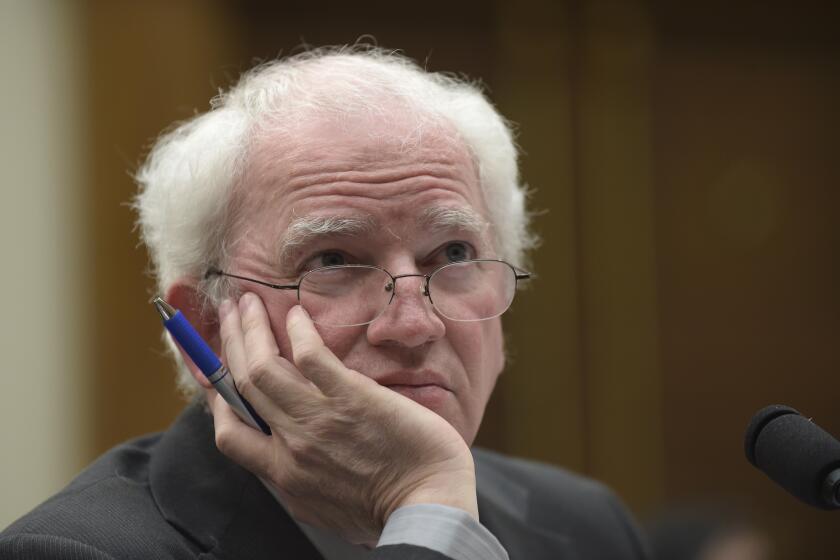Apodaca: UC Irvine law professor sees college degrees as a way to reduce recidivism
- Share via
Keramet Reiter has always had a passion for social justice, possibly inherited from her parents, who served in the Peace Corps in the 1960s.
It was as an undergraduate at Harvard that she found an outlet for that passion, when she volunteered to teach at a nearby prison. Nervous at first and uncertain how her incarcerated students would react to a young woman offering to help educate them, Reiter was pleased when her fears were not realized.
“People were incredibly respectful,” she said. “I was amazed by how engaged and interested my students were.”
That experience led to a lifelong commitment to advancing educational opportunities in prisons, a journey that has taken her from the East Coast to UC Berkeley, where she attended law school and earned a PhD in jurisprudence and social policy.
An associate professor at UC Irvine’s School of Law since 2012, Reiter is now spearheading an important effort to expand educational opportunities for the state’s prison population.
Encouraged by California’s decision in 2014 to begin budgeting for prisoners to work toward associate degrees offered through the state’s community college system, Reiter saw a chance to go a step further and create the means for inmates to earn bachelor’s degrees through in-prison classes.
Her efforts culminated in an announcement late last year that UCI would partner with the California Department of Corrections and Rehabilitation to design an in-prison Bachelor of Arts program.
Dubbed Leveraging Inspiring Futures Through Educational Degrees, or LIFTED, the program will be piloted at the Richard J. Donovan Correctional Facility in San Diego.
Though a similar in-person prison program is currently offered through Cal State Los Angeles, LIFTED will be the first of its kind among the UCs.
Simply put, this is a great idea that benefits not just the prisoners who participate but all of us.
John Eastman’s appearance at the Trump rally on the day of the Capitol riots wasn’t the first time he’s sparked outrage.
Educational programs like this can help reduce recidivism. They have been shown to be successful in breaking the cycle of releasing poorly educated, low-skilled former inmates back into society, where they struggle to find jobs and are far more likely to become repeat offenders if their opportunities remain limited.
There is even evidence that providing education to inmates benefits future generations; children of parents with a college education are more likely to attend college themselves.
A 2019 report by the Vera Institute of Justice and the Georgetown Center on Poverty and Inequality found that former prisoners with higher education levels were more likely to find employment and less likely to return to prison, “potentially improving social and economic outcomes for their communities, families and themselves while leading to significant savings to states.”
Indeed, from an economic standpoint, investing in prison education is a no-brainer.
California spends more than $13 billion annually to incarcerate approximately 125,000 prisoners. The California Legislative Analyst’s Office estimated that in 2018-19 it cost an average of $81,203 annually for each inmate.
Those numbers are unsettling. But now consider that 41% of incarcerated individuals never graduated from high school, a far higher percentage than in the general population.
Research shows that helping prisoners get a good education has proven economic benefits. Most notably, a comprehensive and influential study conducted by the Rand Corp., which reviewed decades of data on correctional education and outcomes, found that every dollar spent on prison education saves nearly five dollars in reincarceration costs over three years.
Chapman University and a local nonprofit are teaming up to provide courses to the formerly incarcerated to reduce their chances of returning to jail.
That’s largely because, the same study found, formerly incarcerated individuals who participated in prison education programs were 43% less likely to reoffend and return to prison.
I’d call that a healthy return on investment.
“Ninety-five percent of people in prison will come home and be our neighbors,” Reiter said. “Giving them an education is the best investment. It actually has documented benefits.”
The plan is for LIFTED to launch with about 25 incarcerated students who are currently working on their associate’s degrees in sociology. After matriculating, and if they meet the UC academic standards, those students will enroll in in-prison classes in fall 2022 — assuming COVID-19 restrictions have been lifted by then — that will set them on the path toward earning B.A.s in sociology.
Once the framework is in place, Reiter hopes to expand LIFTED by offering other majors and opening the program to more students.
“The vision is that this will become integral to the UC system,” she said.
For now, part of Reiter’s challenge in realizing that vision is financial. Though the state provides funding for the in-prison associate’s degree initiative, there is no such funding source for bachelor degrees. So far, she has managed to cobble together enough money from existing UC programs that assist low-income students and from fundraising.
But for LIFTED to grow, it will need more funding from a reliable source.
That’s a goal we should all support, and not just because giving prisoners a chance to turn their lives around is the right thing to do. It’s also a very smart thing to do.
All the latest on Orange County from Orange County.
Get our free TimesOC newsletter.
You may occasionally receive promotional content from the Daily Pilot.





